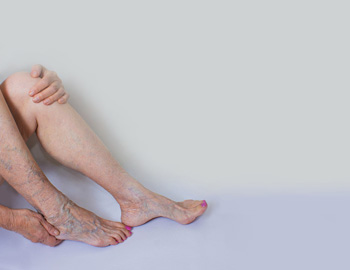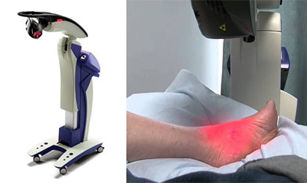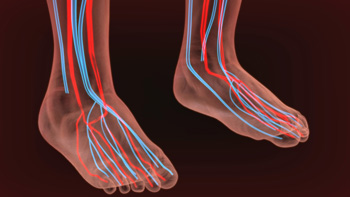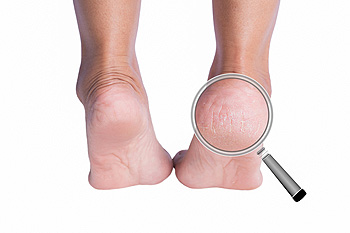Items filtered by date: June 2020
Possible Symptoms of Neuropathy
 The medical condition that is known as neuropathy can affect the feet. Common symptoms patients experience may include a numbing or tingling sensation, and it is often difficult to feel existing cuts or bruises. People who are diabetic may be prone to developing neuropathy. It is beneficial for these patients to have regular foot examinations, refrain from walking barefoot outdoors, in addition to wearing shoes that fit correctly. Relief may be found when blood glucose levels are properly managed, and healthy eating habits are implemented. If you have symptoms of neuropathy, it is strongly advised that you are under the care of a podiatrist who can help you to begin the correct treatment plan.
The medical condition that is known as neuropathy can affect the feet. Common symptoms patients experience may include a numbing or tingling sensation, and it is often difficult to feel existing cuts or bruises. People who are diabetic may be prone to developing neuropathy. It is beneficial for these patients to have regular foot examinations, refrain from walking barefoot outdoors, in addition to wearing shoes that fit correctly. Relief may be found when blood glucose levels are properly managed, and healthy eating habits are implemented. If you have symptoms of neuropathy, it is strongly advised that you are under the care of a podiatrist who can help you to begin the correct treatment plan.
Neuropathy
Neuropathy can be a potentially serious condition, especially if it is left undiagnosed. If you have any concerns that you may be experiencing nerve loss in your feet, consult with one of our podiatrists from Sayville Foot Care. Our doctors will assess your condition and provide you with quality foot and ankle treatment for neuropathy.
What Is Neuropathy?
Neuropathy is a condition that leads to damage to the nerves in the body. Peripheral neuropathy, or neuropathy that affects your peripheral nervous system, usually occurs in the feet. Neuropathy can be triggered by a number of different causes. Such causes include diabetes, infections, cancers, disorders, and toxic substances.
Symptoms of Neuropathy Include:
- Numbness
- Sensation loss
- Prickling and tingling sensations
- Throbbing, freezing, burning pains
- Muscle weakness
Those with diabetes are at serious risk due to being unable to feel an ulcer on their feet. Diabetics usually also suffer from poor blood circulation. This can lead to the wound not healing, infections occurring, and the limb may have to be amputated.
Treatment
To treat neuropathy in the foot, podiatrists will first diagnose the cause of the neuropathy. Figuring out the underlying cause of the neuropathy will allow the podiatrist to prescribe the best treatment, whether it be caused by diabetes, toxic substance exposure, infection, etc. If the nerve has not died, then it’s possible that sensation may be able to return to the foot.
Pain medication may be issued for pain. Electrical nerve stimulation can be used to stimulate nerves. If the neuropathy is caused from pressure on the nerves, then surgery may be necessary.
If you have any questions, please feel free to contact our office located in Sayville, NY . We offer the newest diagnostic and treatment technologies for all your foot care needs.
Shockwave Therapy May Help Chronic Foot Conditions
 There are foot conditions that can benefit from having shockwave therapy performed. These ailments can include plantar fasciitis, bunions, and Achilles tendonitis. It is a procedure that may be able to accelerate the healing process, as the damaged tissue is regenerated. It is applied to the affected area by strong energy pulses, which can stimulate a healing response in the tissues. During this non-invasive procedure, anesthesia is not required, and the healing process is typically faster and easier. If you suffer from chronic foot pain, it is strongly suggested that you seek the advice of a podiatrist who can discuss shockwave therapy treatment with you.
There are foot conditions that can benefit from having shockwave therapy performed. These ailments can include plantar fasciitis, bunions, and Achilles tendonitis. It is a procedure that may be able to accelerate the healing process, as the damaged tissue is regenerated. It is applied to the affected area by strong energy pulses, which can stimulate a healing response in the tissues. During this non-invasive procedure, anesthesia is not required, and the healing process is typically faster and easier. If you suffer from chronic foot pain, it is strongly suggested that you seek the advice of a podiatrist who can discuss shockwave therapy treatment with you.
Shockwave therapy is a treatment commonly used to treat various injuries and conditions, particularly plantar fasciitis in the feet. To learn more, consult with one of our podiatrists from Sayville Foot Care. Our doctors can provide the care you need to keep you pain-free and on your feet.
Shockwave Therapy
Shockwave therapy is a new treatment option designed to treat bone conditions such as tennis elbow, shoulder pain, and others. Shockwave therapy uses high intensity sound waves that are directed to the affected tissues of the body with pinpoint accuracy. The effects are very beneficial, leading to a production of collagen fibers, eliminating inflammation.
Who Benefits from Shockwave?
Shockwave is recommended for patients suffering from heel pain and associated problems. Heel pain is a common condition which can be caused by obesity, overexertion, and spending a substantial amount of time on hard floors with your feet exposed and unsupported.
Fast and Easy
The therapy is actually a simple process that can leave patients feeling better the very next day. Shockwave therapy is not as dramatic as it sounds. It enables more blood flow to effected areas, addressing the source of the problem and allowing treatment to last for a long time.
Treatment & Recovery Time
Shockwave treatment will enable your feet to recover quickly. This is especially important since surgery is not required. It is cost effective and does not require the use of anesthesia. This treatment is a better option to surgery, since it is proven safe.
If you have any questions, please feel free to contact our office located in Sayville, NY . We offer the newest diagnostic and treatment technologies for all your foot and ankle needs.
Cold Feet May Indicate Poor Circulation
 The symptoms that can occur with poor circulation often include a numbing sensation in the limbs, and the feet can tingle and feel cold. The causes of poor circulation may be medical conditions consisting of diabetes, peripheral artery disease (PAD), and obesity. Some of the symptoms that are associated with this ailment can be shortness of breath, chest pain, and many patients can feel tired for the majority of the day. It may be beneficial to begin a vitamin regime, in addition to incorporating gentle exercise and stretching techniques into your daily routine. If you are experiencing any symptoms of poor circulation, it is suggested that you consult with a podiatrist who can guide you toward proper treatment options.
The symptoms that can occur with poor circulation often include a numbing sensation in the limbs, and the feet can tingle and feel cold. The causes of poor circulation may be medical conditions consisting of diabetes, peripheral artery disease (PAD), and obesity. Some of the symptoms that are associated with this ailment can be shortness of breath, chest pain, and many patients can feel tired for the majority of the day. It may be beneficial to begin a vitamin regime, in addition to incorporating gentle exercise and stretching techniques into your daily routine. If you are experiencing any symptoms of poor circulation, it is suggested that you consult with a podiatrist who can guide you toward proper treatment options.
While poor circulation itself isn’t a condition; it is a symptom of another underlying health condition you may have. If you have any concerns with poor circulation in your feet contact one of our podiatrists of Sayville Foot Care. Our doctors will treat your foot and ankle needs.
Poor Circulation in the Feet
Peripheral artery disease (PAD) can potentially lead to poor circulation in the lower extremities. PAD is a condition that causes the blood vessels and arteries to narrow. In a linked condition called atherosclerosis, the arteries stiffen up due to a buildup of plaque in the arteries and blood vessels. These two conditions can cause a decrease in the amount of blood that flows to your extremities, therefore resulting in pain.
Symptoms
Some of the most common symptoms of poor circulation are:
- Numbness
- Tingling
- Throbbing or stinging pain in limbs
- Pain
- Muscle Cramps
Treatment for poor circulation often depends on the underlying condition that causes it. Methods for treatment may include insulin for diabetes, special exercise programs, surgery for varicose veins, or compression socks for swollen legs.
As always, see a podiatrist as he or she will assist in finding a regimen that suits you. A podiatrist can also prescribe you any needed medication.
If you have any questions, please feel free to contact our office located in Sayville, NY . We offer the newest diagnostic and treatment technologies for all your foot care needs.
Heel Pain Can Be Treated!
The Causes and Risks of Cracked Heels
 Cracked heels, although not usually serious, can cause discomfort and may be unsightly to look at as well. Cracked heels can be caused by standing for long periods of time, especially barefoot, from using harsh soaps, and wearing ill-fitting shoes. Most cracked heels can be treated with heel balms, exfoliation, or liquid bandages. However, cracked heels can also indicate more serious medical conditions such as a vitamin deficiency, fungal infection, obesity, psoriasis, or hypothyroidism. In these instances, or instances of severe cracks, care from a podiatrist may be necessary. A podiatrist can provide proper care and medication that may be needed.
Cracked heels, although not usually serious, can cause discomfort and may be unsightly to look at as well. Cracked heels can be caused by standing for long periods of time, especially barefoot, from using harsh soaps, and wearing ill-fitting shoes. Most cracked heels can be treated with heel balms, exfoliation, or liquid bandages. However, cracked heels can also indicate more serious medical conditions such as a vitamin deficiency, fungal infection, obesity, psoriasis, or hypothyroidism. In these instances, or instances of severe cracks, care from a podiatrist may be necessary. A podiatrist can provide proper care and medication that may be needed.
If the skin on your feet starts to crack, you may want to see a podiatrist to find treatment. If you have any concerns, contact one of our podiatrists from Sayville Foot Care. Our doctors can provide the care you need to keep you pain-free and on your feet.
Cracked Heels
It is important to moisturize your cracked heels in order to prevent pain, bleeding, and infection. The reason cracked heels form is because the skin on the foot is too dry to support the immense pressure placed on them. When the foot expands, the dry skin on the foot begins to split.
Ways to Help Heal Them
- Invest in a good foot cream
- Try Using Petroleum Jelly
- Ease up on Soaps
- Drink Plenty of Water
Ways to Prevent Cracked Heels
- Moisturize After Showering
- Skip a Shower
- Keep Shower Water Lukewarm
- Don’t Scrub Your Feet
If you are unsure how to proceed in treating cracked heels, seek guidance from a podiatrist. Your doctor will help you with any questions or information you may need.
If you have any questions, please feel free to contact our office located in Sayville, NY . We offer the newest diagnostic and treatment technologies for all your foot care needs.
Where Is the Plantar Fascia?
 Many types of athletes are familiar with the medical condition that is referred to as plantar fasciitis. It is the result of an injury that can happen from frequent running, or from standing on hard surfaces for extended periods of time. The portion of tissue that is found on the sole of the foot which connects the heel to the toes is known as the plantar fascia. If this tissue becomes damaged, it can cause severe pain and discomfort, and it may be difficult to complete daily activities. Orthotics can be prescribed that may bring relief, and this can help to reduce some of the pressure on the inflamed tissue. If you feel pain in the heel or Achilles tendon, it is advised that you are under the care of a podiatrist who can determine if you have plantar fasciitis, and offer treatment techniques that are correct for you.
Many types of athletes are familiar with the medical condition that is referred to as plantar fasciitis. It is the result of an injury that can happen from frequent running, or from standing on hard surfaces for extended periods of time. The portion of tissue that is found on the sole of the foot which connects the heel to the toes is known as the plantar fascia. If this tissue becomes damaged, it can cause severe pain and discomfort, and it may be difficult to complete daily activities. Orthotics can be prescribed that may bring relief, and this can help to reduce some of the pressure on the inflamed tissue. If you feel pain in the heel or Achilles tendon, it is advised that you are under the care of a podiatrist who can determine if you have plantar fasciitis, and offer treatment techniques that are correct for you.
Plantar fasciitis is a common foot condition that is often caused by a strain injury. If you are experiencing heel pain or symptoms of plantar fasciitis, contact one of our podiatrists from Sayville Foot Care. Our doctors can provide the care you need to keep you pain-free and on your feet.
What Is Plantar Fasciitis?
Plantar fasciitis is one of the most common causes of heel pain. The plantar fascia is a ligament that connects your heel to the front of your foot. When this ligament becomes inflamed, plantar fasciitis is the result. If you have plantar fasciitis you will have a stabbing pain that usually occurs with your first steps in the morning. As the day progresses and you walk around more, this pain will start to disappear, but it will return after long periods of standing or sitting.
What Causes Plantar Fasciitis?
- Excessive running
- Having high arches in your feet
- Other foot issues such as flat feet
- Pregnancy (due to the sudden weight gain)
- Being on your feet very often
There are some risk factors that may make you more likely to develop plantar fasciitis compared to others. The condition most commonly affects adults between the ages of 40 and 60. It also tends to affect people who are obese because the extra pounds result in extra stress being placed on the plantar fascia.
Prevention
- Take good care of your feet – Wear shoes that have good arch support and heel cushioning.
- Maintain a healthy weight
- If you are a runner, alternate running with other sports that won’t cause heel pain
There are a variety of treatment options available for plantar fasciitis along with the pain that accompanies it. Additionally, physical therapy is a very important component in the treatment process. It is important that you meet with your podiatrist to determine which treatment option is best for you.
If you have any questions, please feel free to contact our office located in Sayville, NY . We offer the newest diagnostic and treatment technologies for all your foot care needs.

